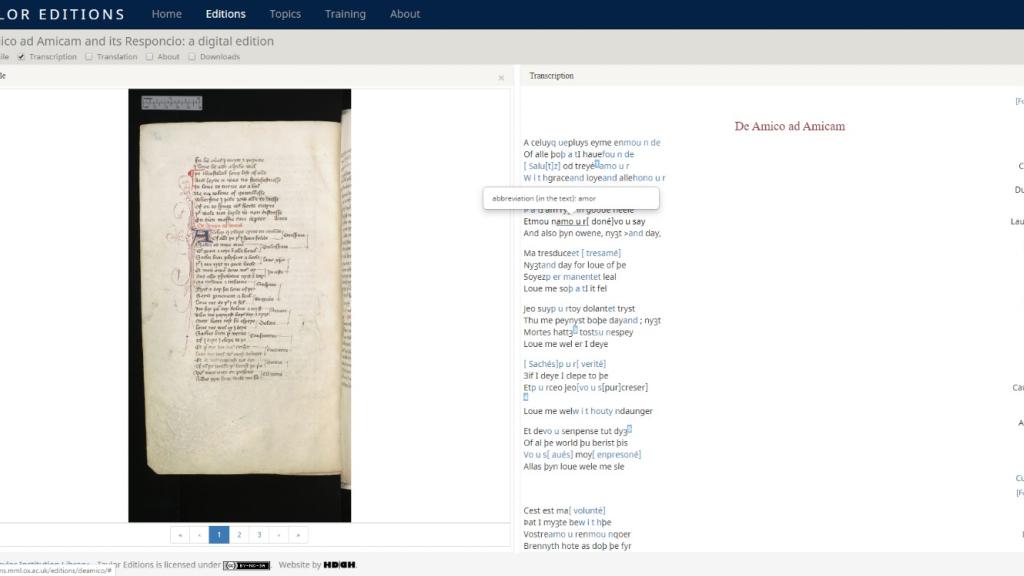
Lockdown has meant some people have been looking for new things to read, and new skills to learn. The Taylor Institution library has been offering courses on how to create digital editions of its treasures for a number of years, and is now offering the course remotely. The training goes far beyond simply making images available online. Students do create digital images, or (during lockdown) link to pre-existing ones, but they also create a searchable transcription, and learn how to encode the text in xml allowing both computational analysis and the presentation of a high-quality scholarly edition. The result is a growing resource of searchable texts, free for all to access.
Students have many different reasons for choosing the texts they do. Some students choose texts because of their own heritage – we have two texts in Welsh in preparation, because the students come from Wales and wanted to make use of the Taylorian’s rich Celtic collections. Other students use the Digital Editions course as part of their wider studies. Two editions last term formed the basis of essays for the MSt in English: Stephen Spender's The Temple : a digital research guide, and In the Name of Time. The Papers of Michael Field.

This image (above) shows where it all started: Masters students from the "History of the Book" Method Option 2015/16 (from left to right: Lucas Eigel: Von der babylonischen Gefangenschaft; Kezia Fender: Ein wunderliche Weissagung von dem Papsttum; Klaus Meyer: Hortulus anime; Jennifer Bunselmeier: Karlstadt's disputatio, Charlotte Hartmann: Hans Sachs Dialogue) working on the Taylorian’s collection of Reformation pamphlets; this led to the first series of Taylor Editions (https://editions.mml.ox.ac.uk/topics/reformation.shtml) – and to the addition of the Digital Humanities component to the Method Option which now has become a highly valued part of the course. It has even developed a dynamic of its own, with the newest cohort of Master students developing social media campaigns based on the digital editions. Read on the History of the Book blog about how the hashtag #showusyourianua led to new insights into a unicum the Taylor Institution Library boasts, a Latin edition of Comenius' seminal work on language learning. You can read the text here and even contribute to updating the edition!
While we encourage students to make use of the collections in the Taylorian, we don’t restrict their choices, or restrict the course to Modern Language students. The Bodleian’s manuscript and rare book collections are also available, as are those from other institutions, with appropriate permissions.
An extraordinary edition was created from a manuscript held in Cambridge by Rebecca Henderson, a gifted student at St Anne’s College who sadly died shortly afterwards. De Amico ad Amicam is a scholarly edition and translation which reflects her interest in the multilingual nature of medieval literature, and in making medieval literature accessible – here, by digital means.
An edition of a more modern work was created by a member of Bodleian Special Collections staff. “Memorandum of steps taken by the Irish government to deal with disloyalty, 11 Dec 1914”.. Archive of Francis John Stephens Hopwood, Baron Southborough, is a scholarly edition of a memorandum on censoring pro-German sentiment in Irish newspapers and “treasonable speeches” at the start of World War One. College Librarians and others have also been interested in the course. The Oxford Union Librarian digitised the amusing Uniomachia, or The battle at the Union : an Homeric fragment, lately given to the world by Habbakukius Dunderheadius, and now rendered into the English tongue by Jedediah Puzzlepate Written as a humorous account of a conflict amongst the members of the Oxford Union Society in the Michaelmas term of 1833, the poem Uniomachia succeeded in healing divisions and securing the future of the Society.

Another edition, of Voltaire’s Dialogue entre un brahmane et un jésuite sur la nécessité et l'enchaînement des choses, was created by a member of staff at the Voltaire Foundation in order to learn digital skills before embarking on a large online publication. His edition shows two different witnesses of the same text, along with a standardised reading text. A blog post on his experience is available on the Voltaire Foundation blog. The Digital Editions course has been used as pre-project training by another group, this time from the Oriental Institute. The TextCourt project is researching Chinese Court theatre, and is hoping to create digital editions of some of the plays. The first was created at the Digital Editions course and will soon be available online.
Students learn many skills through this course – they are drawn by the opportunity to work closely with special collections material, yet they learn how to manage a digitisation project, gain advice on funding bids, learn about digital preservation, online publishing, and of course, editorial skills. The feedback has been overwhelmingly positive, with several students going on to do more work in Digital Humanities as a direct result of their experience.
The course has continued through lockdown, with the choice of texts restricted to those with images already available (not such a problem with the ever-increasing number of images available from institutions around the world). A hidden advantage of this is that the materials from the course are now freely available online to anyone with an interest in learning about digitisation. If you would like to engage with Special Collections, why not give it a try? There is something enormously fulfilling about sharing an edition of a text you are passionate about with a wider audience, and it’s very rewarding to be able to share that experience through this course.